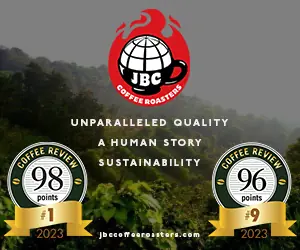The concerns raised by those apprehensive about the use of pesticides and agricultural chemicals in coffee growing are twofold. First is the health issue for the consumer: whether harmful chemical residues may reach our systems when we drink coffee. Second are the related environmental and social issues: whether buying coffees that may be grown with the help of potentially harmful chemicals contributes to the destruction of the environment and threatens the health of the rural poor who raise coffee.
Agricultural Chemicals and Consumer Health. The consumer health issue is simplest to address. Coffee is not eaten raw like lettuce or apples. The bean is the seed of a fruit. The flesh of this fruit is discarded. Along the way the seed is soaked, fermented, and subject to a thorough drying process. Later it is roasted at temperatures exceeding 400°F, and finally broken apart and soaked in near boiling water. This savage history concludes when we consume only the water in which the previously soaked, fermented, dried, roasted, and infused seed was immersed. Given this history of relentless attrition, it hardly seems possible that much if any of the small amounts of pesticide/fungicide residue permitted by law in green coffee ever make it into the cup.
Chemical Free Alternatives. In brief, coffee drinkers concerned about the impact of agricultural chemicals on environment and society or those unwilling to accept my reassurances on the consumer health issue have essentially three alternatives:
- Buy a traditional coffee, grown as coffee was grown from its inception, before agricultural chemicals were invented. All Yemen, almost all Ethiopia, and most Sumatra Mandheling coffees are grown in such a state of innocence, and all are among the world’s finest.
- Buy a certified organic coffee. Certified organic coffees are coffees whose growing conditions and processing have been thoroughly monitored by independent agencies and found to be free of pesticides, herbicides, fungicides, chemical fertilizers, and other potentially harmful chemicals. The monitoring agencies visit the farm and verify that no chemicals have been used on the farm for several years, and then follow every step of the processing, preparing, transporting, storage, and roasting. Such careful monitoring is of course expensive, which is one reason certified organic coffees cost more than similar uncertified coffees. Many such certified organic coffees are the product of socially and environmentally progressive cooperatives. See pages PPP-PPP for more on organically grown coffees.
- Buy a coffee labeled "sustainable." At this writing sustainable is a rather loose term meaning that, in the view of the importer or roaster, designated farmers are doing everything within reason to avoid the use of agricultural chemicals and to pursue enlightened environmental and socially progressive practices in the growing and processing of their coffees.










